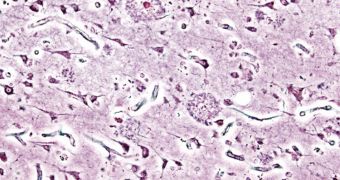Researchers at the Case Western Reserve School of Medicine say that the drug bexarotene – commonly used against skin cancer – can help address early-stage Alzheimer's disease. The substance acts on neural plaques made from beta amyloid proteins.
In all patients suffering from this neurodegenerative form of dementia, huge amounts of this molecules conglomerate in the brain, forming solid structures called plaques. These irreversibly destroy neurons, leading to cognitive impairment and, eventually, death.
In a study conducted on unsuspecting lab mice, investigators determined that rodents displaying the earliest signs of Alzheimer's had a lot to benefit from receiving bexarotene. The drug acts directly on reducing amyloid concentrations in the brain.
The fact that this molecule has a lot to do with the development of dementia is one of the few certainties that experts have about Alzheimer's. Now that they've found results that are so encouraging, the CWRU team is bound to continue investigating this chemical.
One of the most interesting aspects of the new work is that mice with high amyloid levels that got bexarotene experienced a reduction in their protein levels of 25 percent in just 6 hours. Additionally, a proportional increase in cognitive functions was also recorded.
All the mice the team used in this research were models for Alzheimer's, meaning that they were genetically engineered to develop the condition. The fact that the onset of dementia was prevented, and in some cases even reversed, is a critical discovery.
“The data we provide here really suggest that Alzheimer's could be, in the early stages, a reversible disease,” CWRU PhD student in neuroscience and study autor, Paige Cramer, explains. The scientist was also the author of the research paper, LiveScience reports.
The US Food and Drug Administration (FDA) has already certified bexarotene for human use in treating a form of cancer called cutaneous T-cell lymphoma.
Details of the new investigation were published in the February 10 issue of the top journal Science.
Unlike past approaches to treating Alzheimer's, the new one does not go after the amyloid plaques themselves. It attacks the source of the problem, which is the initial, high concentration of beta amyloid in neural tissue.

 14 DAY TRIAL //
14 DAY TRIAL //